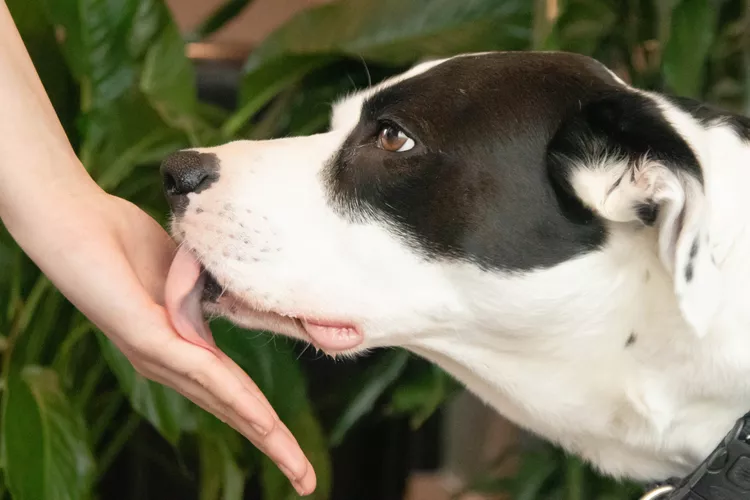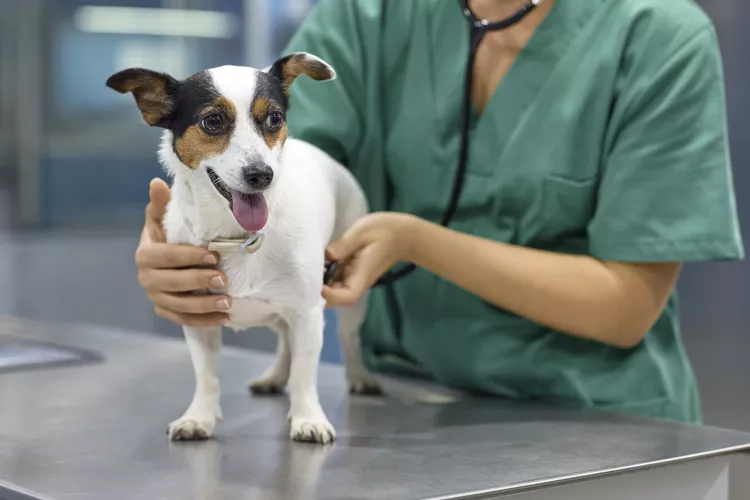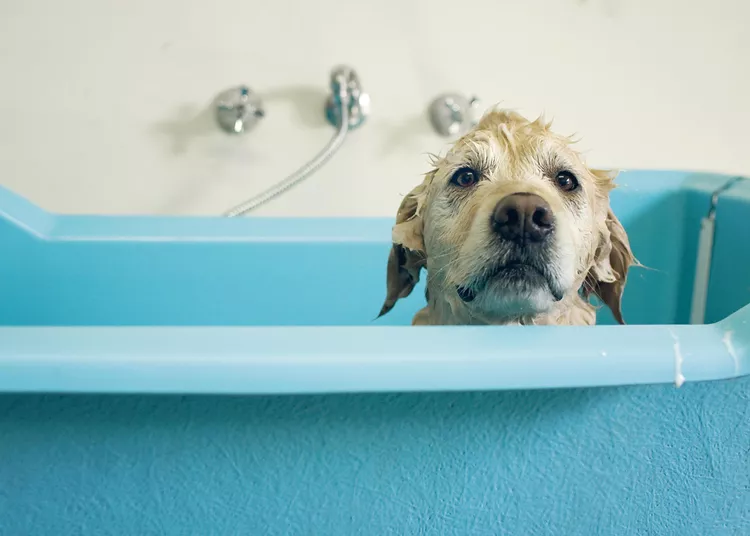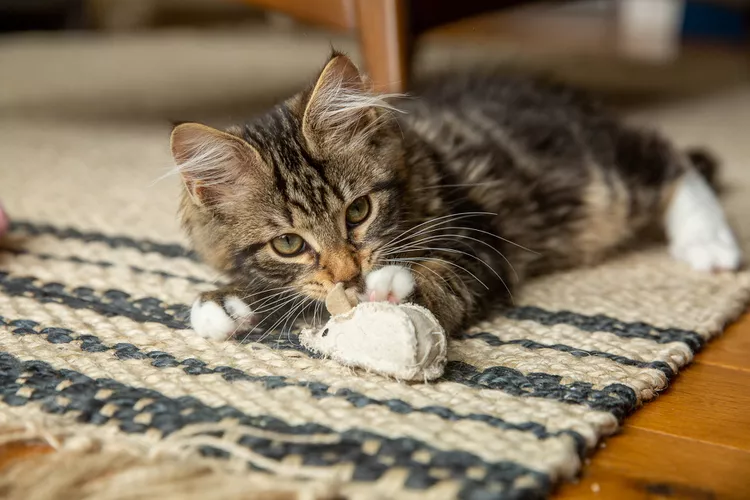
Yes, dogs will lick you to show their affection—giving you kisses—but there are several other reasons you could end up with a slobbery face or hand. By licking you, your dog might be looking for attention, following their wild instincts, or just figuring out how you taste.
It's a common, relatively harmless behavior most dog owners accept as a sign of canine love, but in rare cases the licking can indicate your dog is suffering mentally. Learn more about why dogs lick—and what you can do if you want it to stop.
While we don't know for certain why dogs lick, most experts agree there's probably a combination of reasons. In most cases, licking is not considered a serious behavior problem unless it bothers you. Knowing the reason for your dog's licking, however, might change the way you feel about it.
There's a good chance your dog is licking you to show their affection. It's why many people equate them with kisses. Licking is a natural action for dogs. They learned it from the grooming and affection their mothers gave them as puppies. Dogs might lick your face if they can get to it. If not, they might just go for any available patch of skin: hands, arms, legs, feet, and even ears.
Some dogs tend to lick less than others. This does not necessarily mean a dog is less affectionate. They might have just learned things differently as a puppy or they simply don't prefer licking.
Dogs will also lick you to simply get your attention. It often starts as a sign of affection, but then it's reinforced by a person's reaction: laughing, smiling, or petting.
Maybe your dog is bored or lonely. There you are and they want your attention. When a dog is seeking attention, they will feel rewarded by any kind of attention, even the negative type. Pushing them away, saying "no," or even administering punishment still means you're not ignoring the licking. This can encourage the licking even further.
Dogs may also lick you because they're following their wild instincts. When wolves (and sometimes dogs in the wild) return to their pups after a meal, the pups lick around the adults' mouths. The wolves then regurgitate meat from the hunt for the pups to chow down. Some believe this licking behavior has been passed down in wolves' DNA, causing dogs to instinctively do it sometimes.
Another reason dogs lick you: They want to see how you taste. Once that dog gets to licking you, they might realize you have an intriguing salty, flavor. Dogs love anything that has an interesting taste. Plus, licking is a way for your dog to explore their world. You're part of that world after all.
There are rare cases when your dog licking you can indicate a problem. Know the signs so you can help your pup feel better.
Although it's rare, dogs can lick because they suffer from obsessive-compulsive disorder, often brought on by prolonged stress and anxiety. Licking that occurs constantly (and usually involves the licking of objects, surfaces, and themselves in addition to humans) may be a real problem.
Talk to your veterinarian if you think your dog's licking is concerning. They might refer you to an animal behaviorist for help.
Your veterinarian or a veterinary behaviorist may also prescribe medication to help relieve anxiety. Remember, animals cannot learn while in a high state of anxiety. So medication may be used as a tool to curb licking in conjunction with training. Pharmaceutical treatment may even be used temporarily while your dog goes through training and behavior modification.
Yes, it's usually relatively harmless to let your dog lick you. However, don't believe the old myth that dogs' mouths are cleaner than humans' mouths. Dogs' mouths contain a lot of natural bacteria, which is part of the reason dog bites are so dangerous. However, this bacteria probably won't cause harm unless it gets into an open wound.
Getting your dog to stop licking you (and others) is usually a matter of denying attention when they do it. When unwanted licking starts:
In time, your dog will usually get the point: Licking is undesired behavior.
You can also be proactive, preventing your dog from licking you by distracting them. So instead of giving them the chance to lick, you go straight to:
Speaking of new tricks, if you really don't mind the occasional canine kiss, you can always teach your pup how to give you some sugar.
We'll never know for sure, but licking accompanied with other excited behavior can mean your dog loves you. Or, perhaps, they love how you taste.
That's up to you. Just remember that dogs' mouths contain hundreds of bacterial species, so it can be icky. Dog licks probably won't make you sick, but don't let them lick any open wounds. (And keep up with regular vet appointments and teeth cleanings.)
Keep your dog from licking others by distracting them. If you have people coming over, give your dog a food puzzle or enrichment toy to play with as your guests arrive. If it's a big enough problem, keep your dog separated from your guests in another room or outside.

10 Obscure, Little-known Canine Facts in Honor of National Dog Day
With National Dog Day upon us, it's time to celebrate everything about our favorite pets—even the weirder stuff. Here are 10 obscure facts about dogs you probably didn't know.
Exploring the Different Types of Pet-Friendly Beaches
Are you looking for pet-friendly beaches? Learn about the different types of pet-friendly beaches, their locations, and tips for visiting them with your pet.
Toxic Chemicals & Household Items That Can Poison Dogs
There are many things in and around your home that can endanger your dog. Learn which chemicals and household items can poisin your dog.
Bronchitis in Dogs
Is your dog coughing and feeling unwell? It could be due to respiratory inflammation called bronchitis. Learn the causes, treatment, and prevention.
Choking in Dogs
A dog can occasionally swallow something incorrectly and start choking. Find out how you can tell if your dog is choking and what you can do about it.
Why Does My Dog Smell So Bad?
Does your dog smell? Find out what could be causing these unpleasant odors and if it's something that needs more than just a bath to fix.
Is Rosemary Safe for Dogs?
Rosemary is used both for cooking and as a supplement with many reported health benefits in people, so you may be wondering if it is safe to give to your dog. Rosemary is considered non-toxic for dogs but with some caveats.
Can Dogs Eat Blueberries?
Dogs can safely eat blueberries. Blueberries are packed with nutrients and can be a great addition to your dog's diet when fed in moderation. Learn more about the benefits, risks, how to incorporate blueberries into their diet, and other fruits dogs can eat.
Dog Food Basics
Are you feeding your dog the best way possible? Check out these dog feeding tips to keep your dog healthy and happy.
Swedish Vallhund: Dog Breed Characteristics & Care
The Swedish vallhund makes for a high-energy and affectionate companion. Learn about the breed's history, health, exercise needs, and more.
Becoming a Show Dog: Getting Started
Do you have the perfect puppy? Have you considered showing her in a dog show? There's much more to showing than showing up! Here's how to get started.
How to Care for a Hairless Cat
Hairless cats make great pets but they aren't without their own challenges and requirements. Read on to learn how to best care for your furless feline.
British Shorthair: Breed Profile, Characteristics & Care
The British Shorthair is a calm, affectionate cat that looks and feels like a plush teddy bear. Here's what you need to know about this popular breed, including appearance, temperament, health, and care.
Tonkinese: Cat Breed Profile, Characteristics & Care
The Tonkinese cat is a perfect mix of the Siamese and Burmese—smart, sociable, and sweet. Learn about the Tonkinese breed.
How to Stop Your Cat From Chewing Electrical Cords
Cats are known to pounce and attack inanimate objects, like electrical cords. Learn how to prevent your cat from ambushing objects that may harm it.
How to Stop Aggression in Kittens
Kittens may show aggressive behavior for several reasons. Sometimes their play gets too aggressive while other times the kitten is afraid or upset. Learn how to spot and curb aggression in kittens.
46 Egyptian Cat Names
Whether inspired by notable Egyptian deities, locales, or pharaohs, Egyptian cat names can bring out the divinity of your noble feline companion.
How to Tell If a Kitten is a Boy or a Girl
If you're wondering whether your new kitten is a boy or a girl, here are three ways to help determine the sex of your cat.
Signs Your Cat Is Aging and When to See the Vet
Expect some changes when your cat ages. Learn to differentiate between normal and potential medical problems for your elderly cat.
Coronavirus in Cats
Feline coronavirus (FCoV) rarely harms cats but can lead to another life-threatening illness. Learn the causes, treatment, and prevention.